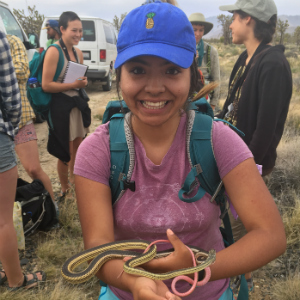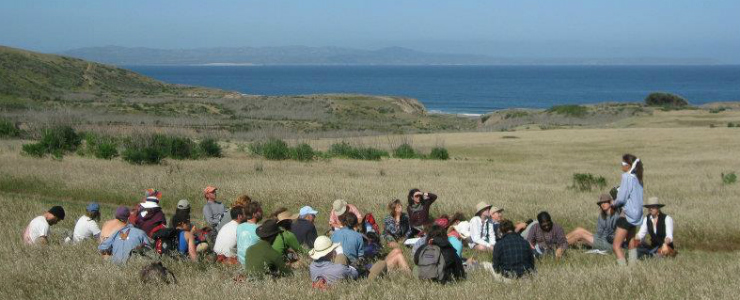What is NHFQ?

Started by Ken Norris in 1973, Natural History Field Quarter (NHFQ) is a 15-unit upper division Environmental Studies class taught each spring quarter. It is open to all majors.
Core Curriculum
Observation and inquiry are two of the cornerstones of science and many other disciplines. The primary goal of NHFQ is to teach you how to develop your own knowledge about the natural world through your own direct personal observation, inquiry, and reflection. This will come from practicing your observation skills at every opportunity, intentionally applying your curiosity to the world around you, and engaging in critical thinking to gain insight into nature’s complexities. It will also require significant amounts of patience, discipline, and humility.
While on NHFQ, you will have 3 main learning tools to help you develop your nature observation and inquiry skills:
- The time and effort you put into directly observing & researching the natural world, both in and outside of class.
- The attention you give to recording your own knowledge-development journey in your field journal.
- Your willingness to support, contribute to, interact with, and be inspired by the observations, questions, presentations, reflections, poetry, artwork, realizations, etc. of your peers and instructor-team.
In order to reach this goal, NHFQ integrates the following core curricular elements:
- We live, camp, and learn outside for extended periods of time. Over the spring quarter, we visit a variety of natural ecosystems across California. This allows us to witness the spring season as it moves northward and upward across the diverse landscapes of California.
- We slow down and minimize distractions from the larger human world. When out exploring the environment, we move slowly in order to explore things in detail. We develop practices to stay present in our environment as much as possible.
- We observe organisms up close. This includes: collecting and keying plants; watching and identifying birds; catching and identifying lizards, snakes, frogs, salamanders, insects, and other invertebrates; live-trapping and identifying small mammals; and examining dead organisms, tracks, and scat.
- We research and discuss current land management and conservation issues at the places we visit. Whenever possible, we invite current land managers and practitioners to discuss these issues with us.
As a student, you do not need to have any previous experience with these curricular elements. We will teach you how to comfortably live outdoors as well as how to closely engage with organisms both safely and respectfully.
Life During Field Quarter
NHFQ can be both mentally and physically challenging and involve long, demanding days. Living and working in close quarters with a group of peers in remote environments can be both rewarding and stressful. While previous camping and hiking experience is not a prerequisite to this course, having experience with long physically-demanding days (such as a job that requires long hours moving on your feet) can be helpful.
A typical day on NHFQ often involves:
- Sleeping in a tent (and occasionally a cabin at some locations)
- Waking up at 6:00 a.m. and working with your peer cook crew to prepare breakfast for the whole course
- Meeting at 8:30 a.m. prepared to be outside all day
- Going on hikes (often off-trail) typically ranging from short distances to 6 miles in whatever weather conditions are present (temperature, wind, precipitation)
- Focusing on developing your natural history observation and interpretation skills, especially by writing in your field journal throughout the entire day
- Making a 20-minute presentation to your peers about a topic you researched and prepared prior to each long trip
- Returning to camp around 4:00 p.m., with options to have individual down time before dinner or continue field journaling, keying plants, etc.
- Eating dinner together outside at 6:00 p.m.
- Meeting after dinner several times a week at 7:30 p.m. for an evening meeting that might involve a student or instructor presentation or discussion
- Wrapping up the day by 8:30 p.m.
Safe Learning/Working Environment
NHFQ is different from most other academic courses in two major ways: 1. The course takes place in remote field settings, often far from important resources such as emergency medical services. 2. We live together in close quarters, can’t get away from each other, and are separated from our broader support communities. For these reasons, it is vital to co-create a community that is both safe and supportive. A few of NHFQ’s specific safe learning environment expectations include: participating fully in the course, giving and receiving feedback, respecting one another even when you disagree, creating a supportive inclusive environment for everyone, following the non-negotiable safety rules, and practicing proactive self-care. We talk in detail about these expectations and others at the beginning of the course.
Professional Development
The skills you develop on NHFQ are transferable to a diversity of career paths, including land management, conservation, ecology, field biology, earth science, education, art, writing, and much more. These include the core skills of nature observation and inquiry, as well as topical knowledge of the places, organisms, and issues we study. But they also include the skills of creating a safe learning/working environment and living comfortably outside for extended periods of time. Many Field Quarter alumni identify NHFQ as a key pivotal experience in their academic and career trajectories.
Taken together, your experience on NHFQ will prepare you for similar professional work environments in your future. Throughout the course, we will focus on your professional development through specific assignments, discussions, and networking opportunities with the many practicing professionals we will interact with.
Life Benefits
In addition to career preparation, NHFQ can help you develop a lifelong practice of engaging with nature that can contribute to your long-term physical, mental, and emotional health. It is also likely that the peer community created on NHFQ will outlast the duration of the course and contribute to both your personal and professional network that you build throughout the rest of your time in college and beyond. And finally, living and learning together outside in a supportive atmosphere can be a lot of fun!
Academic Credit
The course is open to all majors. ENVS majors must have completed ENVS 100 before taking NHFQ. NHFQ offers 15 units of upper-division ENVS course credit, but does NOT meet the ENVS exit requirement. Ecology and Evolutionary Biology students can receive 10 units of upper-division credit for the course. Students taking NHFQ cannot simultaneously enroll in any other courses.
Students who apply but are not accepted onto the course are strongly encouraged to apply again.
Course Costs and Logistics
An additional course fee of $1,000 per student covers transportation and lodging. Need-based scholarships are available by separate application to students each year which pay for part or all of the course fee. There are also additional costs for food and gear. For most student situations, it is unrealistic to have a job during the quarter.
Students need to obtain appropriate camping and natural history gear, including boots, sleeping bag/pad, tent, binoculars, field guides, etc. Some of this gear can be borrowed from the Norris Center or rented from the Adventure Recreation Department. Other items, such as hiking shoes, students will need to obtain for themselves.
Students must have housing in the Santa Cruz area during the quarter. The course typically goes on two three-week trips, and meets in Santa Cruz before, in between, and after each trip. These meetings are a required part of the course. Class typically meets 9:00-4:00 up to 4 days a week while in town. These days include important academic classes, trip prep and clean-up, as well as field trips to nearby locations. Students should plan to be available during these times. In between our two long trips, we take an extended break of several days to rest and recuperate.
Questions?
If you have any questions about the course, please contact Chris Lay at the Norris Center (Natural Sciences 2 Room 241) or via email at cml@ucsc.edu. More detail about the course will be discussed at the NHFQ information session on Thursday October 17 from 7-8:30pm in Natural Sciences 2 Room 233.

